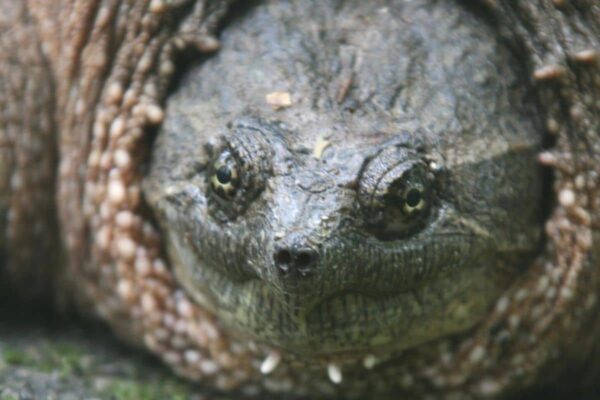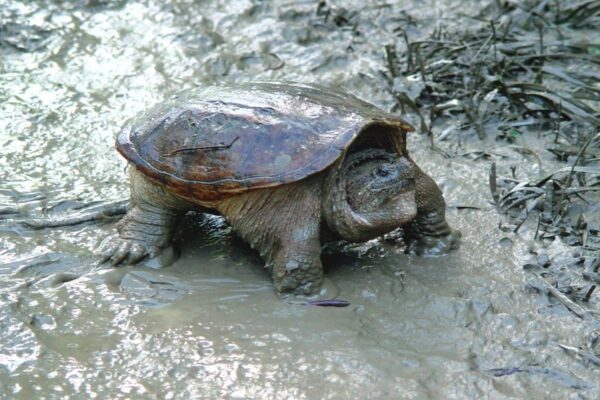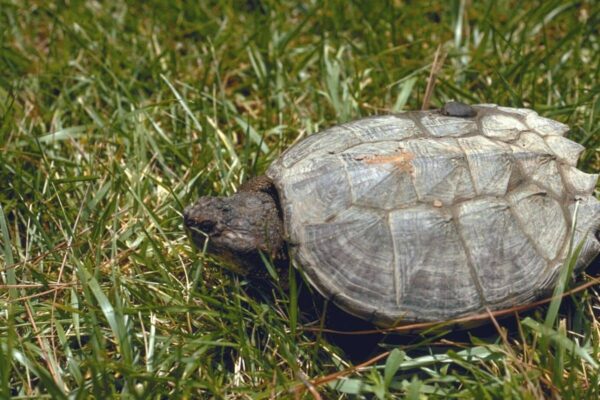Common snapping turtle
Warning
Snapping turtles are a very large turtle with a powerful bite. Do not attempt to handle these turtles without proper safety equipment (heavy gloves).
About This Species
Common snapping turtles are found throughout the Central and Eastern United States. In Canada, their native range extends from Southern Saskatchewan to Nova Scotia. In BC, Common snapping turtles have been found on Southern Vancouver Island – three individuals were reported near Port Alberni in 2012, where another adult was found in 2014. It is unknown how these turtles were brought to BC, they most likely are escaped or released aquarium pets, or from outdoor private ponds. There now is evidence that a population is established / breeding in in Devils Den Lake.
Common snapping turtles have a generalist diet – they will eat fish, other turtles, amphibians, carrion, adult ducks and ducklings, and possibly even small rodents. They are much larger than any other freshwater turtle species found in BC, and may displace native turtles from their habitat, outcompete them for food and prey on native turtle hatchlings.
How to Identify
Fully grown adult Common snapping turtles can be between 20-50 cm long and grow to 4.5-16 kg. They are the largest freshwater turtle in BC and can be easily distinguished from other species in the province.
Common Snapping Turtles have a tail about two-thirds of the length of the shell, with a prominent series of knobby scales. The underside of the shell (the plastron) is far smaller than the upper part of the shell (the carapace) and as such, a lot of knobby skin is exposed around the legs and neck. Common snapping turtles also have very long, stout claws, and are overall brown in colour as adults.
Young ones almost appear black, but have the same body features. Their behaviour is also distinct – adults will stand their ground and strike if approached, even turning to face anyone trying to out flank them.
Take Action
Common snapping turtles are kept as pets in some parts of Canada. But remember that they will grow to be as large as a stop sign and can live for over 100 years. Also note is illegal to bring a Common Snapping Turtle into BC from elsewhere in Canada, and illegal to keep them in captivity in BC. Do not release Common snapping turtles into the wild – if you must dispose of a pet, please turn it in to the BCSPCA.
If you need advice about invasive species on your property or you are concerned about reported invasives in your local area, contact your local government or regional invasive species organization.
-
If you need advice about invasive species on your property or you are concerned about reported invasives in your local area, contact your local government or regional invasive species organization.

Don't Let It Loose
Learn about best practices
Invasive species are plants, animals or other organisms that are not native to BC, and have serious impacts on our environment, economy and society. Never release your plants and animals into the wild or dump aquariums or water garden debris into rivers, streams, lakes or storm sewers!
REPORT TO PROTECT BC’S BIODIVERSITY

Use the app
Observe and report to protect BC’s biodiversity

Report through this website
Use our form to tell us what you’re seeing and where.





